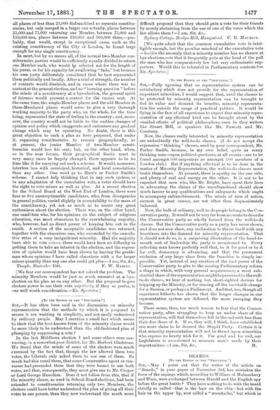[To THE EDITOR OF THE "SPECTATOR. " ] SIR, — It has often been
said in the discussions on minority representation that the methods by which it is proposed to secure it are wanting in simplicity, and not easily understood by ordinary people. May I mention a small fact which seems 'to show that the best-known form of the minority clause would be more likely to be understood than the old-fashioned plan of plumping by suppressing a vote ?
In the last Middlesex election I and some others were can- vassing, in a somewhat poor district, for Mr. Herbert Gladstone. We found that the minds of some of the electors were much exercised by the fact that, though the law allowed them two votes, the Liberals only asked them to use one of them. So much had this vexed them, that some Conservative agent or can- vasser had persuaded them that they were bound to use both votes, and that, consequently, they must give one to Mr. Cooper ,or Lord George Hamilton. Does it not follow from this, that if the minority clause, as used in School-Board elections, had been extended to constituencies returning only two Members, the electors could have better understood the plan of giving all their votes to one person, than they now understand the much more
difficult proposal that they should gain a vote for their friends by merely abstaining from the use of one of the votes which the law allows them ? —I am, Sir, &c., Sydney Cottage, Roslyn Hill, Hampstead. C. E. MAURICE.
[We quite admit that the common cumulative vote is intel- ligible enough, but the peculiar mischief of the cumulative vote —besides the anomaly that a minority member has no chance at bye-elections,—is that it frequently puts at the head of the poll the man who has comparatively few but very enthusiastic sup- porters. Would this be tolerated in Parliamentary contests ?- En. Spectator.]


































 Previous page
Previous page